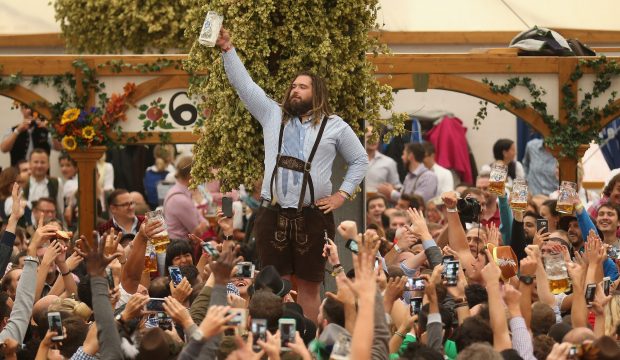 There once was a time when we, Australians and Americans, used to have a good laugh at the countries of Western Europe, nanny states all, infantilising and mollycoddling their peoples with an endless array of laws, rules and regulations to supposedly make the everyday lives better and safer. I excluded Canada from the first part of the sentence because Canada has always really been a big piece of Europe in Northern America, rather than a freedom-loving and irreverent Anglo wild frontier society that both the Oz and the US thought of themselves us. I also excluded Eastern Europe, because there for almost half a century after the war, the nanny looked and acted more like a 180-pound butch female prison guard.
There once was a time when we, Australians and Americans, used to have a good laugh at the countries of Western Europe, nanny states all, infantilising and mollycoddling their peoples with an endless array of laws, rules and regulations to supposedly make the everyday lives better and safer. I excluded Canada from the first part of the sentence because Canada has always really been a big piece of Europe in Northern America, rather than a freedom-loving and irreverent Anglo wild frontier society that both the Oz and the US thought of themselves us. I also excluded Eastern Europe, because there for almost half a century after the war, the nanny looked and acted more like a 180-pound butch female prison guard.
Alas, Europe is now having the last laugh. Sure, their governments still on average tax more, borrow more and spend more than ours, being the original social democratic behemoths and all that. They still might be a lot more interventionist and intrusive in business, the economy and the welfare state as a whole, but there continues to exist a curiously Euro-libertarian attitude towards the individual, very much at odds with the new generation of (mostly, but far from exclusively, left-wing) Australian and American busy-bodies who want to save us all from ourselves.
I don’t claim this blog post to be in any way scientific. It’s merely based on a few first-hand observations from my four weeks in four north-western European countries. Perhaps a think-tank could do a comparative study. Until then, here are five things I noticed:
Alcohol is widely available – including in supermarkets. Albert Heijn, the largest chain in the Netherlands, was offering a special: a carton of Heineken for 10 euro. Yes, you read that right – 10 euro, or about a third of what you pay for a slab of Heineken, or an average slab of beer, in Australia. Unlike Brisbane and Sydney, most European cities don’t have curfews and lock-out laws on clubs and pubs. Cities like The Hague, Utrecht or Groningen in the Netherlands, or Berlin, have no restrictions on opening hours at all. In Amsterdam, venues nowadays close at 1am on weeknights and 3am on weekends – the unhappy locals call it “vertrutting”, or making the city more boring. And it is.
So are the cigarettes – and without the plain packaging. As a result, you see more people smoking, particularly young women. I’m not a fan myself, so I don’t particularly rejoice in this freedom, but a freedom it is. While most indoor venues are smoke-free, large public facilities – for example airports – have multiple designated closed spaces for smokers to use.
Dogs on public transport – and not just guide dogs for the blind. I have shared many a pleasant tram ride, as well as train journey from Rotterdam to Paris, in company of some cute little furry creatures – and I’m not talking about the kinky Dutch here.
No bike helmets – this is perhaps what everyone notices first, considering the astonishing numbers of bicycles through European cities. Of the thousands of riders I’ve seen, only a handful were wearing helmets, most often small children. Too many, particularly young, cycle while engrossed in their smart phones. This is arguably not a great idea but police don’t stop them, and drivers, cyclists and pedestrians are used to coexisting and comingling without significant casualties. If you are a visitor, however, it takes time to get used to and full attention.
Speed limits – are more reasonable on the motorways. As accustomed I am to Australian speed limits I confess to experiencing for the first time in my life being driven at 140km/h. Legally, that is.
I don’t necessarily make a claim that all these are good and, conversely, any respective restrictions would be bad – there is a fair argument, for example, that the inconvenience of everyone having to wear a bike helmet is outweighed by the decrease in fatalities and serious head and brain injuries sustained in accidents. Sometimes drawing a line can be difficult if you’re not an absolutist. By and large, Europeans seem to be happy with their current balance.
Of course talking about “Europe” and then contrasting it with Australia or the United States is engaging in a gross generalisation. As the recent survey by the European Policy Information Centre, a centre-right think-tank, shows, nanny statism varies widely across the continent, with the Czech Republic the freest and Finland the most nannied. Sadly, the United Kingdom ranks as the third least free, pointing to the rising trend of paternalism throughout the Anglosphere. By contrast, Germany, the Netherlands and Austria are among Europe’s freest nations. You wouldn’t particularly see it as a Germanic trait, would you? (Germans call the Dutch “swamp Germans”, which the Dutch, needless to say, quite resent).
So in this particular aspect the question becomes – can we be less like Great Britain and more like Germany?
Arthur Chrenkoff blogs at The Daily Chrenk where this piece also appears.
Got something to add? Join the discussion and comment below.
Get 10 issues for just $10
Subscribe to The Spectator Australia today for the next 10 magazine issues, plus full online access, for just $10.

























Comments
Don't miss out
Join the conversation with other Spectator Australia readers. Subscribe to leave a comment.
SUBSCRIBEAlready a subscriber? Log in